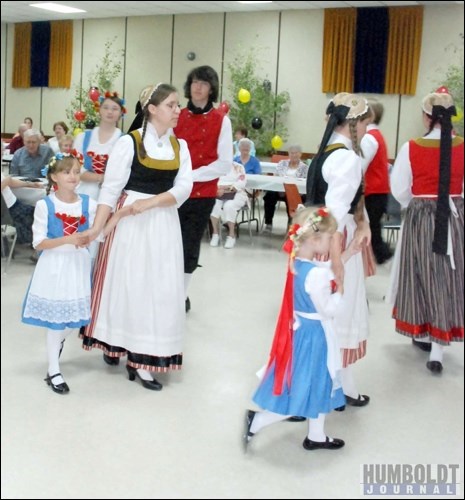A hearty welcome to all - or "Ein herzliches Willkommen an alle" - was given at the third annual German Day or Deutscher Tag held August 8 in Humboldt.About 200 people gathered at the Legion Hall in Humboldt for the event, which carried the theme, "Celebrating our heritage and our youth."The crowd was treated to entertainment honouring both throughout the day - German music by the Little German Band, dancing by the German Junior Folkdancers of Saskatoon, and the playing of the Alpine bells or Aplenglocken by Elizabeth Viczko of Lake Lenore - along with children's activities like glass mosaic making, face painting and colouring.Add to that a meal of bratwurst, sauerkraut, weiners, doughnuts and other refreshments, and it was a very German affair, indeed.
Why is it important to celebrate German Day? John Saxinger, president of the Humboldt and District German Heritage Society (HDGHS), a group determined to keep the German heritage and culture alive in this region, had the answer to that question."Myself, I'm a first-generation Canadian," he said. "It's our heritage. If we don't keep it up for the next generation, it's going to be lost."Saxinger was impressed by the number of young people attending the event, and by the number of those who are not of German descent who decided to take in the festivities, which were open to all.To have different nationalities represented at their German Day "is great," Saxinger noted. As for the kids present, "It's fantastic that they're here," he smiled, as he looked at the children's games tables, which were crowded with young people.
"That's what we like to see," he said, nodding towards that corner of the hall. "All full of young people... who always seem to be enjoying themselves."For the last couple of years, the event was held in Water Ridge Park, but this year, due to the unpredictable weather and the wealth of mosquitoes, they decided to move it indoors."We would have been doing the Schuhplattling (dance) with mosquitoes and without music," Saxinger joked, referring to the traditional German "slapping" dance.German dancing, the "Ribbon Dance" in particular, performed right before the official ceremonies, was a highlight of the day for many in the crowd. The ribbon dance was one that used to be performed by Humboldt's German dancers, and one that the German Junior Dancers from Saskatoon have only just learned and performed for the first time in Humboldt."It's amazing that someone takes the time to teach the young people those old dances," Saxinger said during the official ceremonies.
"One of the strange things here in Saskatchewan is that we don't always celebrate all our ethnic backgrounds," said MP Brad Trost in his remarks. "Especially German." Perhaps, he theorized, it's because the German culture is so common in this province - both our premier and our leader of the opposition are German, he said, as was one of our most famous exports to Ottawa, Prime Minister John D. Diefenbaker. "In many ways, Saskatchewan is almost a German province," Trost said. But it is still important, he noted, to celebrate the German culture, which he says is about family and tradition.Though she's of Irish background, Humboldt MLA Donna Harpauer said she appreciates representing and living in a German community. The German settlers brought with them entrepreneurship and an industrious work ethic, and all that has contributed to the province cannot be overlooked, she said. She commended the club for keeping the German culture alive and well in Humboldt. "You have a heritage... you should be proud of," she said.
"The importance of cultural heritage is clearly one of the City's greatest assets," said Mayor Malcolm Eaton of Humboldt, who spoke on behalf of the municipalities in the Humboldt district. It's exciting to see, he added, the renewed energy and enthusiasm within the HDGHS as they welcome new members, focus on youth and start new programs, such as a German language program they plan to offer this fall. Saskatchewan German Council president Ilona Beck was on hand to present two big cheques to the HDGHS - one for $500 to start up their German language program, and another to the club to help fund the German Day event. A German language program, Beck said, will open up the door to culture and tradition to everyone, especially young people, as there is no better time to learn a second language, she noted, than in childhood. German Days, Beck stated, are very important to the Sask. German Council, as they raise the image of the German culture in Saskatchewan. Humboldt, she said, is a model of German heritage development in the province, and she commended the HDGHS for their theme this year, which focuses partly on youth."We need young people to rejuvenate... our memberships," Beck said of the German clubs around the province.Young generations are needed, she noted, to bring new ideas and open up new horizons to German groups in Saskatchewan. Representatives of the three religious groups in the area - Abbot Peter Novecosky of the Order of St. Benedict at St. Peter's Abbey, Sr. Philomena Dobmeir of the Franciscan Sisters of St. Elizabeth and Sr. Maureen Maier of the Ursuline Sisters of Bruno, also spoke during the ceremonies about the connections between their orders and the Humboldt area, especially the early German settlers, as the orders all spoke German.


.png;w=120;h=80;mode=crop)

